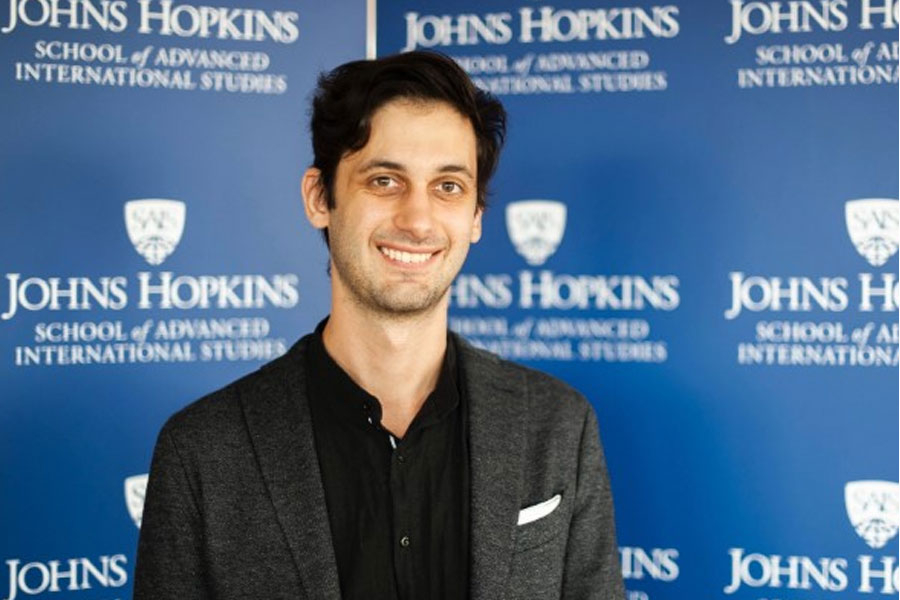Gaining Insights into Effective International Cooperation

Laurence Alexander Dynes
Master of Arts in European Public Policy
Master of Arts in European Public Policy
What encouraged you to apply to Johns Hopkins SAIS and what were you doing before you came here?
After graduating from university, I took a position at a data analytics company in my home city London. While I enjoyed my work, I wanted to start a career in the public sector and began to look for a Master’s that would give me both the knowledge base and the career support to do so. After reaching out to alumni and hearing their positive testimonies, I chose SAIS believing it would be the best place to achieve these goals.SAIS was certainly a major factor in me forming this goal: coming from a very different sector to that which I wanted to transition to, it was easy to feel a little lost at times. However, the academic and professional experience I have gained since has given me both the knowledge to form well-defined aspirations, and the skillset to pursue them.
How did you learn about the MEPP program?
An alumnus with whom I spoke suggested the program to me after I had mentioned my particular interest in European affairs.What did you hope to gain from it?
While I had a basic understanding of European affairs before starting my Master’s, I did not have much in-depth knowledge, and on a more practical level, I had little awareness of the day-to-day functioning of many institutions that interested me. My aims were thus twofold: to develop a regional, specialized academic knowledge of European affairs, and to increase my professional understanding of how these sectors worked and how my skillsets would fit into them.Tell us about one of your favorite experiences, classes, or memories at school.
At the end of the semester, one of my courses had a class-wide competition. We split into four groups, each presenting different scenarios for the future of the EU, ranging from its further unification to its outright disintegration. Creativity was encouraged, and the resulting presentations were both entertaining and thought provoking. My personal favorite was for the “total disintegration” scenario, in which the team staged a funeral for the EU, with eulogy-style speeches for each component leading to disintegration. There was even a prize for the best presentation – I am sure my rose-tinted memory of the class is influenced by my team’s win!Do you have an internship/job lined up for after SAIS/this summer? What kind of projects or assignments will you be working on at your new job/internship? How have your SAIS studies prepared you to take on these challenges?
I am currently finishing my internship at the Food and Agriculture Organization (FAO) in Rome, where I have been contributing to a project that examines approaches for internalizing economic externalities to food production. The SAIS career service was crucial in my obtaining of this internship, allowing me the opportunity to network with people who worked there and prepare for the interview process. This November, I start a new position at the Organisation for Economic Co-operation and Development (OECD), working in the Public Management and Budgeting Division on issues relating to economic inequality.As a graduating student what is some advice you would give to future students?
SAIS Europe offers a huge amount beyond the academic, including professional writing courses, coding courses such as Python and R, incredibly high-quality language classes, multiple opportunities for alumni networking, and simply the chance to surround yourself with intelligent and capable peers. Beyond this, its relative smallness means that opportunities to have in-depth conversations with the professors (many of whom had previously worked in sectors that interested me) about both the topic material at hand and one’s own career aspirations were frequent. My advice would therefore be to get involved in as many activities as possible, as much of what you will gain will likely be beyond the classroom.What career pathways do you see for yourself following your MEPP studies at SAIS? How have your experiences as an MEPP student changed you and your views for the future?
While studying the history and functioning of the EU has certainly made me realize the difficulties associated with effective international cooperation, it has also made me recognize its importance. I would therefore like to continue working in international organizations, particularly in settings that allow me to advise governments and other policy stakeholders using the experiences and best practices of other countries as guidance. SAIS was certainly a major factor in me forming this goal: coming from a very different sector to that which I wanted to transition to, it was easy to feel a little lost at times. However, the academic and professional experience I have gained since has given me both the knowledge to form well-defined aspirations, and the skillset to pursue them.Do you have anything to add about your experience here: your student cohort/ SAIS Europe faculty or alumni you have met? How have fellow classmates added to your learning experience?
My fellow classmates were a major positive contribution to my overall experience. There was a rich diversity of nationalities, many of which had multi-country backgrounds. Furthermore, they had varied professional experiences, ranging from risk analysts for major international corporations to field workers for local NGOs. This led to significant diversity of thought, and many interesting stories – indeed, some of the most stimulating conversations I had during my Master’s occurred not in the classroom, but in the school’s café, chatting to other students. Many of the friends I made are now scattered worldwide, and while it is sad that they are no longer a quick walk through Bologna away, it is comforting to know I that there are so many cities across the world where I have a place to stay!Enjoyed reading Laurence's experience? Learn more about our Master of Arts in European Public Policy.